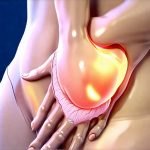Urinary tract infections (UTIs) are incredibly common, affecting millions of people annually – disproportionately women, but certainly not exclusively. Beyond the often-discussed symptoms like frequent urination and burning sensations, many individuals report a frustrating experience: that UTI pain seems to intensify when they’re trying to sleep. This isn’t necessarily a sign of a worsening infection, but rather a complex interplay between physiological changes at night, how our bodies perceive pain while resting, and even psychological factors related to being alone with discomfort. Understanding why this happens can be incredibly validating for anyone experiencing it, and can also help inform conversations with healthcare providers about managing symptoms effectively.
The experience of increased UTI pain at night isn’t simply anecdotal; it’s a frequently reported phenomenon that highlights the nuances of chronic pain perception. During waking hours, we are often distracted by daily activities, work, or social interactions. This constant stimulation can partially mask discomfort. However, when we lie down to sleep, distractions diminish and our focus naturally shifts inward, making us more acutely aware of bodily sensations – including those caused by a UTI. Additionally, changes in body position can also contribute; some positions might put pressure on the bladder or surrounding areas, exacerbating pain. The goal here isn’t to diagnose or treat, but to provide comprehensive information about this common experience and offer potential explanations for it.
Why Does UTI Pain Seem Worse at Night?
The intensification of UTI pain during nighttime hours is a multifaceted issue rooted in both physiological and psychological factors. It’s not simply that the infection itself is more severe at night, but rather our perception of the pain changes. One key element is the shift in hormonal balance as we prepare for sleep. Melatonin, the hormone regulating sleep-wake cycles, also influences pain modulation. While melatonin generally has analgesic (pain-reducing) properties, its effects can be complex and vary between individuals. Some studies suggest that melatonin might increase sensitivity to certain types of pain, particularly those related to inflammation – a common component of UTIs.
Another contributing factor is the change in fluid intake and output. During the day, we typically stay hydrated by drinking regularly, leading to more frequent urination which can help flush out bacteria. However, many people reduce their fluid intake before bed to minimize nighttime bathroom trips. This reduction in urine production can lead to a higher concentration of irritants in the bladder, intensifying discomfort. Furthermore, lying down for extended periods doesn’t allow gravity to aid in emptying the bladder as effectively as it does during activity.
Finally, psychological factors play a significant role. As mentioned earlier, we have fewer distractions at night, and the quiet environment can amplify sensations. The feeling of being alone with pain can also be psychologically distressing, leading to increased anxiety which further heightens pain perception. It’s important to remember that pain is subjective; how someone experiences it is influenced by their individual circumstances, emotional state, and overall health.
Understanding Pain Perception & UTIs
Pain isn’t just a simple signal traveling from the site of injury to the brain. It’s a complex process involving multiple pathways and influenced by various factors. Nociceptors – specialized nerve endings – detect potentially harmful stimuli (like inflammation in the bladder) and send signals to the spinal cord, which then relays them to the brain. The brain interprets these signals as pain, but it also modulates the intensity of that pain based on things like mood, stress levels, and past experiences. Chronic pain conditions often involve changes in these pathways, leading to heightened sensitivity and prolonged discomfort.
UTIs specifically trigger this process through inflammation. Bacteria infecting the urinary tract cause irritation and swelling, activating nociceptors in the bladder wall. This sends signals along the nervous system, resulting in the familiar burning sensation and urgency associated with UTIs. The intensity of pain depends on factors like: – The type of bacteria causing the infection – The severity of inflammation – Individual pain tolerance – The location of the infection within the urinary tract (bladder vs. kidneys)
It’s important to note that everyone experiences pain differently. Some people have a higher pain threshold, meaning they can tolerate more discomfort before feeling it intensely. Others are more sensitive to pain due to genetic factors or underlying medical conditions. This variability explains why some individuals report excruciating UTI pain while others experience milder symptoms.
The Role of Body Position & Bladder Pressure
The way we position our bodies during sleep can directly impact the amount of pressure exerted on the bladder and surrounding organs, potentially exacerbating UTI pain. Certain positions might compress the bladder, making it feel fuller or intensifying the sensation of urgency. For example, lying flat on your stomach can put significant pressure on the pelvic region. Conversely, sleeping on your side with a pillow between your knees can help alleviate some pressure and promote better alignment.
Furthermore, prolonged periods in one position without movement can contribute to discomfort. When we’re active during the day, our bodies are constantly shifting and changing positions, which helps to redistribute pressure and prevent stagnation. However, when we sleep, we remain relatively still for hours at a time. This lack of movement can lead to muscle stiffness and increased sensitivity in the pelvic area.
It’s also worth considering that bladder capacity naturally decreases as we age. As we get older, our bladders become less elastic and hold less urine. This means that even a small amount of urine in the bladder can trigger strong sensations of urgency and discomfort. For older adults with UTIs, this effect may be particularly pronounced at night.
What Can Be Done to Manage Nighttime UTI Pain?
While managing UTI pain requires appropriate medical treatment (typically antibiotics prescribed by a healthcare professional), there are several strategies that can help alleviate nighttime symptoms: 1. Stay Hydrated – During the Day: Consistent hydration throughout the day helps flush out bacteria and reduces urine concentration. However, reduce fluid intake a few hours before bed to minimize nighttime trips to the bathroom. 2. Empty Your Bladder Before Bed: Fully emptying your bladder before sleep can help reduce pressure and urgency. 3. Experiment with Sleeping Positions: Find a position that minimizes pressure on your bladder and pelvic region – side sleeping with a pillow between your knees is often recommended. 4. Warm Compress: Applying a warm compress to the lower abdomen or back may help soothe muscle tension and alleviate pain. 5. Over-the-Counter Pain Relief (with caution): Discuss the use of over-the-counter pain relievers like ibuprofen or acetaminophen with your doctor, as they can have side effects and interact with other medications. Always follow dosage instructions carefully.
It’s crucial to remember that these are just supportive measures; they do not replace medical treatment. If you suspect you have a UTI, it’s essential to consult a healthcare provider for diagnosis and appropriate treatment. Ignoring symptoms or attempting self-treatment can lead to more serious complications, such as kidney infection. And if your nighttime pain is severe, persistent, or accompanied by other concerning symptoms (like fever, chills, or back pain), seek immediate medical attention.





















